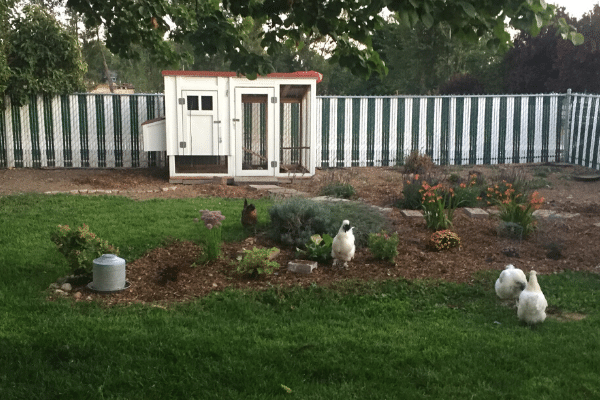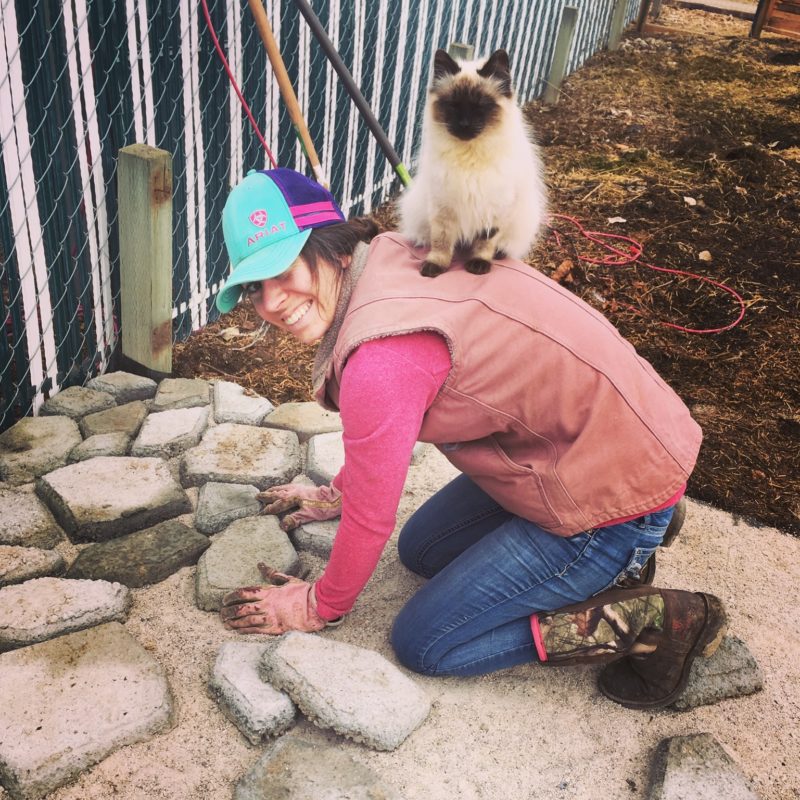
As the snow begins to melt and the crocus start to push up through the earth, there’s no denying that Spring has finally come! It can be a very busy time of year as we rush to plant gardens, care for newly born animals and enjoy some extra outdoors time! But, spring is also an important time for every chicken keeper. It’s a time to watch and assess your flock and clean up after a long winter. But it’s also a time to just enjoy being outside with your chickens!
Here are 5 chicken care tips that will help to keep your flock in tip-top shape during the spring season!
Chicken Care Tips for Springtime:
Spruce up the Chicken Coop
Spring cleaning isn’t just for your house! Spring is a wonderful time to air out the chicken coop and give it a good cleaning! Don’t forget to also scrub out water and food dishes! Since springtime can be a damp time, check for any areas that may be drafty or where moisture could build up. It’s still very important to protect your flock against frostbite when overnight temperatures drop, even if the daytime highs are warm and pleasant. The best way to ward off frostbite is to keep your coop well ventilated, but not drafty.
If you live in a particularly rainy climate, you may notice that your chicken run can become extra muddy during the spring! Adding a new layer of sand can help mitigate some of the muddy conditions and increase soil drainage. You can also use small round gravel in areas where there is poor drainage. Providing branches or logs can also give your chickens an area where they can escape the mud during the rainy season.

Make Predator Protection a Priority
Spring can be a particularly active time for many predators as they enter mating season and search for fresh foods after the long winter. Make sure your flock is as safe as possible by checking their coop and run. If your flock is free-ranging, keep an extra close eye out for any signs of predators during the spring. It’s also important to make sure that your flock is securely locked up from dusk to dawn, when predators are the most active.
Perform Spring Flock Health Checks
After a long winter, when chickens are more sedentary due to the weather, it’s important to do a quick health assessment of your flock. It’s easy for mites and parasites to go undetected during the winter months. Check at the base of their feathers (especially near the vent area) for feather mites/red mites. Check the scales on your chickens legs and feet for any signs of leg mites. And don’t forget to check droppings for signs of internal parasite overloads. Treat your chickens accordingly. Providing fresh, dry dirt baths will also help your flock fight off those pesky mites! Here’s how to make a year-round dirt bath that will stay dry regardless of the weather!

Prepare for Eggs!
Spring is the time when chickens start laying eggs in abundance! Prepare for eating and sharing lots of eggs during this time of heavy laying. It’s also important to watch for any egg abnormalities that may show up. Egg abnormalities can be a signal of issues or deficiencies in their nutrition.
Speaking of feed, spring is a great time to start incorporating a higher protein diet for your chickens to support egg laying and increased physical activity. If your flock free ranges, they will no doubt find all sorts of delicious bugs and worms to snack on. Or, you can supplement your flock with some mealworms, cooked eggs, fish or other meat sources.
Prepare for Chicks
If you are planning on expanding your flock, it’s time to purchase or gather your chick supplies. If you are using a heat lamp, make sure that it’s secured properly, is clean and free of dust and is working properly. It’s also a good idea to plan how you will transition the new chicks into your existing flock once they are old enough. We like to do this by using a second coop so that our existing flock has a chance to meet the new chicks over a few weeks before the chicks are let out to free-range with the older chickens.
And, since we are talking about chicks, it’s important to keep a close eye on any broody hens – especially if you have a rooster and your chickens free range! You never know when one of your hens will disappear only to surprise you a few weeks later with a clutch of new chicks!
 Kaylee Vaughn is a suburban homestea0der, caring for chickens, goats, and a large garden on a little less than an acre. She and her family strive to create the most efficient homestead possible in the small space we have available. Her chickens are not only beautiful yard ornaments, but also a vital part of their homestead management practices! “We utilize them to produce manure, control pests, turn compost, and more.” Kaylee’s nick-named them “the gardeners” because they are always in the garden, working hard – and redecorating on occasion, too! You can follow Kaylee through her website.
Kaylee Vaughn is a suburban homestea0der, caring for chickens, goats, and a large garden on a little less than an acre. She and her family strive to create the most efficient homestead possible in the small space we have available. Her chickens are not only beautiful yard ornaments, but also a vital part of their homestead management practices! “We utilize them to produce manure, control pests, turn compost, and more.” Kaylee’s nick-named them “the gardeners” because they are always in the garden, working hard – and redecorating on occasion, too! You can follow Kaylee through her website.












